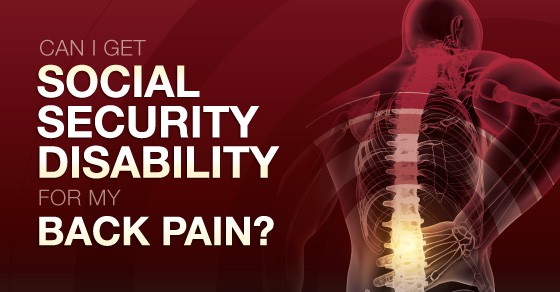
“Oh, my aching back!”
If you’ve ever had a sore back brought on by overexertion, you know how debilitating it can be. For many of us, some pain relievers and a day or two of rest is enough to alleviate the pain. But for someone with chronic and disabling back pain, there is no relief – no matter how much they try to rest their back, the pain prevents them from working and providing for their family.
Back pain is the most common ailment worldwide, and it’s the most common reason people here in the U.S. seek Social Security Disability Insurance (SSDI). The occasional sore back isn’t cause for seeking disability; individuals with chronic back pain that keeps them from working must be able to prove their injury through medical documentation. The road to being awarded disability for back pain can be a long one, and many do not qualify.
Causes of back pain
Back pain can come from a number of sources, and it’s a common injury for those weekend warriors among us. But it’s not just pulled muscles that cause back pain. Other causes include:
- Bulging or ruptured disks
- Muscle or ligament strain
- Arthritis
- Skeletal irregularities
- Osteoporosis
- Injuries
- Disease
- Inflammation
Back Pain That Qualifies for SSDI
The SSA has a well-defined list of issues involving the spine that qualify for SSDI and these must be diagnosed by your doctor in order to provide proof of your condition for your disability claim.
Back pain with no known cause is not sufficient to be awarded benefits, even if the pain is so bad that you cannot work. You, with the help of your doctor, must be able to provide an identifiable cause for your back pain. A diagnosis may be obtained through the results of an MRI or x-rays, which will provide some of the information the SSA will need to make a determination. If your pain is the result of injury, an accident, or disease, this information will help strengthen your case to receive SSDI. Providing objective proof is only part of the process, however. You will also need to demonstrate that you have sought and received treatment for your pain, and are continuing to seek relief through treatment.
Age As a Factor
While back pain is a common ailment, individuals with chronic and debilitating back pain must provide a great deal of information to prove that their condition merits SSDI. Another factor that can work in your favor is your age.
You are more likely to be awarded SSDI for back pain if you are 50 years of age or older. The SSA will examine your work history and determine if you are able to do any other type of work based on your work experience. Individuals in their 20s, 30s, and 40s may have less success in receiving SSDI benefits for back pain due to their age – the SSA takes the long view that a younger individual may be able to develop a different skillset that would allow them to seek different employment. If, however, you are in your 50s with chronic and debilitating back pain, this can be an advantage to your case. Individuals in their 50s and beyond are viewed as less likely to be able to work in a different career field based on their years of work experience.
Consider someone who has worked in construction for their entire career; if they are injured on the job and their back pain keeps them from working in the construction field, it is highly unlikely they would have the skillset to change careers. Their ability to develop this skillset in order to find different employment is lessened due to their age.
The Basic Criteria for All SSDI Cases
Regardless of medical issues that trigger an SSDI application, the SSA has a basic set of criteria for consideration to receive SSDI:
- You must have a qualifying condition or combination of conditions
- You must be able to provide medical evidence of your condition
- Your condition should be limiting the number of hours you work, if you can work at all
- Your condition is expected to last at least one year or result in death
Seeking Help
If you are suffering from back pain that is keeping you from working, you will want to apply to receive Social Security Disability Insurance (SSDI). However, being awarded SSDI for back pain takes careful planning and documentation, and the SSDI application process can take up to two years before a final decision is rendered. Your application may be denied. You may not know what to do next if your application is denied. An attorney with experience in navigating the SSDI process can help you to meet each challenge along the way to a final decision.
